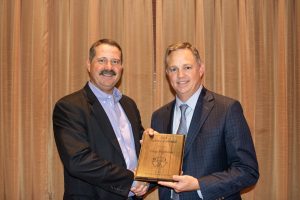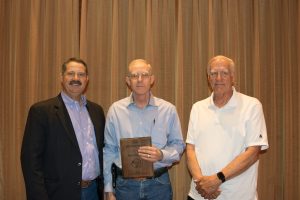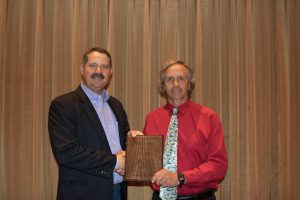2018 Pioneer Awards
Dr. Tim Holt || Craig Huffhines || Dr. R. Mark Thallman
Dr. Tim Holt
LOVELAND, Colorado – The Beef Improvement Federation (BIF) presented Dr. Tim Holt, Fort Collins, Colorado, the BIF Pioneer Award June 21 during the group’s annual meeting and symposium in Loveland, Colorado. The award recognizes individuals who have made lasting contributions to the improvement of beef cattle, honoring those who have had a major role in acceptance of performance reporting and documentation as the primary means to make genetic change in beef cattle.
One of the challenges for beef producers in the western United States is environmental adaptability, whether it be for heat, scarcity of forage or other challenges. For those raising cattle above 5,000 feet, one of the greatest challenges is resistance to High Mountain Disease (HMD) commonly called brisket disease.
Dr. Holt played a pivotal role in the development and delivery of a veterinary test that predicts susceptibility to pulmonary hypertension — the underlying cause of HMD. Dr. Holt received his DVM from Colorado State University in 1988. He performed his first PAP test in early 1980, and has since collected more than 350,000 PAP observations.
Much of his data has served as the basis for heritability estimates at a multitude of elevations and more recently for the development of PAP EPD and for identification of markers reducing susceptibility to HMD. Travelling more than 75,000 miles a year offering PAP measurement services from New Mexico to Montana, he is the key ranch expert for breeders and breeding programs across the region, providing advice, expertise, and approaches to reducing brisket disease and making genetic progress in high elevation herds.
Dr. Holt also organizes a biennial PAP Summit training for post-graduate veterinarians. These continuing education events serve as the mechanism to train field-veterinarians and to keep them informed of the latest research results in this area.
He is currently contributing to the development of PAP measurement guidelines for the BIF, has developed a heart-scoring system to determine levels of pulmonary hypertension and heart tissue remodeling at harvest.
“Dr. Holt’s PAP efforts have taken him not only all over the western U.S., but to Ethiopia, Peru, and India,” says Mark Enns, BIF board member and Colorado State University professor. “His energy, enthusiasm and passion for helping high-altitude cattle producers is infectious as anyone who has worked with him will attest. In his role as associate professor in clinical sciences, he is training the next generation of veterinarians in appropriate measurement technique of PAP and generating enthusiasm for livestock production in the Rocky Mountains.”
Craig Huffhines
 LOVELAND, Colorado – The Beef Improvement Federation (BIF) presented Craig Huffhines, Amarillo, Texas, the BIF Pioneer Award June 21 during the group’s annual meeting and symposium in Loveland, Colorado. The award recognizes individuals who have made lasting contributions to the improvement of beef cattle, honoring those who have had a major role in acceptance of performance reporting and documentation as the primary means to make genetic change in beef cattle.
LOVELAND, Colorado – The Beef Improvement Federation (BIF) presented Craig Huffhines, Amarillo, Texas, the BIF Pioneer Award June 21 during the group’s annual meeting and symposium in Loveland, Colorado. The award recognizes individuals who have made lasting contributions to the improvement of beef cattle, honoring those who have had a major role in acceptance of performance reporting and documentation as the primary means to make genetic change in beef cattle.
A native Texan, Craig received his undergraduate degree in animal science from Texas A&M University. He was then recruited to Colorado State University (CSU) by Dr. Gary Smith to work on a study that showed the feedlot performance of Hereford-influenced cattle and palatability characteristics of Hereford beef. He was project leader for the CSU Hereford study, which formed the basis for the CHB program.
Craig served as executive vice president of the American Hereford Association (AHA) from 1997 to 2015. He initially joined the AHA staff in 1992 upon completing a master’s degree at CSU. His early responsibilities included director of feedlot and carcass programs for AHA’s Certified Hereford Beef® (CHB) program. He was named CHB director in 1995, launching a fully aligned, breed-specific, branded beef program into the retail and foodservice sectors.
“Craig has never been afraid of a challenge, and has been a real advocate for breed improvement and technology within the beef industry,” says Jack Ward, AHA executive vice president and BIF board member.
Under his leadership, AHA implemented the Whole Herd Total Performance Records (TPR) program, developed the National Reference Sire program, moved toward a full multi-trait genetic evaluation, led the development of a Pan-American genetic evaluation and led the movement toward incorporating genomics to the AHA genetic evaluation.
“In addition to breed improvement tools, Craig’s vision was to make the AHA efficient through technology and utilizing all tools to keep the AHA fiscally strong,” Jack adds.
He has served in several industry leadership capacities, including president of the National Pedigreed Livestock Council from 2003 to 2006, chairman of the BIF Emerging Technology Committee from 2004 to 2007, chairman of the U.S. Beef Breeds Council and a member of the National Cattlemen’s Beef Association (NCBA) National Animal Identification working group and USMARC advisory committee.
“Craig has been a true pioneer in the beef industry and his leadership roles at the AHA pushed the membership to focus on breed improvement tools that would make the commercial industry more profitable,” Jack says.
Craig is currently executive vice president of the American Quarter Horse Association. Craig and his wife, Mary Jon, are the parents of three sons — Seth, Cole and Miles.
Dr. R. Mark Thallman
 LOVELAND, Colorado – The Beef Improvement Federation (BIF) presented Dr. R. Mark Thallman, Blue Hill, Neb., the BIF Pioneer Award June 21 during the group’s annual meeting and symposium in Loveland, Colorado. The award recognizes individuals who have made lasting contributions to the improvement of beef cattle, honoring those who have had a major role in acceptance of performance reporting and documentation as the primary means to make genetic change in beef cattle.
LOVELAND, Colorado – The Beef Improvement Federation (BIF) presented Dr. R. Mark Thallman, Blue Hill, Neb., the BIF Pioneer Award June 21 during the group’s annual meeting and symposium in Loveland, Colorado. The award recognizes individuals who have made lasting contributions to the improvement of beef cattle, honoring those who have had a major role in acceptance of performance reporting and documentation as the primary means to make genetic change in beef cattle.
Mark is recognized internationally as a leading scientist in the areas of beef cattle breeding and statistical genetics. His career is devoted to the application of technology to accelerate the genetic improvement of beef cattle. He has co-authored 49 peer-reviewed articles; one peer-reviewed book chapter; 40 conference proceedings; and 12 technical reports, manuals and theses. He is the first author of 29 of these 101 publications, has given 49 invited presentations and is frequently consulted by the beef industry on a variety of topics.
Thallman co-leads the Germplasm Evaluation Program at the U.S. Meat Animal Research Center (USMARC) in Clay Center, Neb. — the largest meat animal research center in the world. The germplasm program is recognized as the most comprehensive beef breed evaluation ever conducted, influencing the beef industry in the United States and worldwide.
Thallman earned his bachelor’s degree in animal science (1981), master’s in animal breeding (1988), and a doctorate in genetics (1995), all from Texas A&M University. After working for nearly a decade for major beef cattle seedstock producers, Mark joined USMARC as a research associate in October 1996. He went on to become a permanent staff member in June 1998.
“Mark is widely recognized for his innovative fundamental and applied approaches to cattle improvement and for a strong desire to see them adopted by the beef industry,” says Darrh Bullock, BIF board member and University of Kentucky extension professor.
Genetic evaluation has been a common theme throughout Thallman’s career. He has served as the USDA-ARS representative to the BIF board of directors since 2006 and has participated in most BIF conventions since 1983. He served on the Carcass and Live Animal Evaluation subcommittee to write guidelines for ultrasound technician certification in 1990 and the Emerging Technologies subcommittee of the BIF to write guidelines for use of DNA testing in beef cattle improvement from 2004 to 2007. He also served on the ad hoc committee in 2007-2008 to revise the BIF Guidelines, which is the most highly respected source that breed associations and other organizations rely on when setting policy related to genetic improvement. He also currently serves as the chairman of the BIF Genomic and Genetic Prediction Committee. He received the BIF Continuing Service Award in 2009.
“The ability to develop innovative solutions to challenging problems is one of his greatest attributes,” Bullock says. “Thallman has influenced the nature of DNA tests offered commercially, the ways in which the results of these tests are reported and the ways and extent to which producers utilize these tests. He identified selective reporting of DNA test results as a problem and proposed a solution that has been implemented by major DNA testing companies.”

